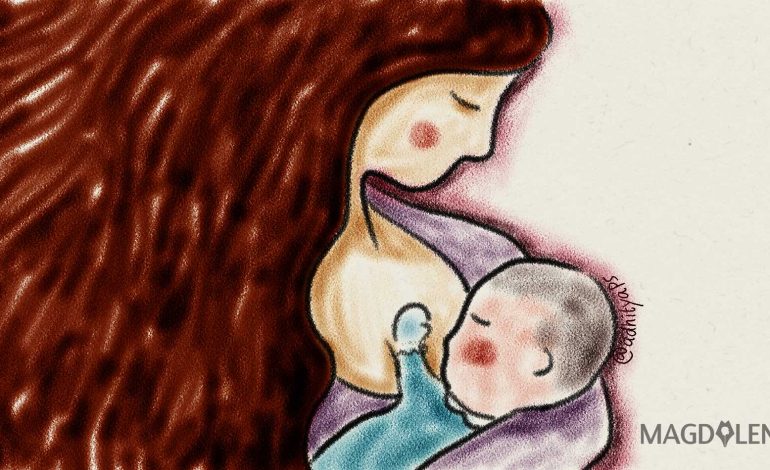Wanted: Sympathetic Breastfeeding Campaign

I never understand breastfeeding Nazis, as well as the moralizing and the smugness surrounding breastfeeding. I was first introduced to this type around a decade ago, when a couple of friends, and then a few others, had babies and, as much as they wanted to, had difficulties nursing.
Unlike me, whose motherhood instinct does not come naturally, these friends had always dreamed of being mothers and the dream included exclusive breastfeeding. But things didn’t go as planned for them. Despite everything they had done – going to lactation clinic, consuming food/drinks/herbs said to induce milk production, massage – their breast milk production was next to none.
When their babies began losing weight, some by as much as 10 percent of their birth weight, they finally resorted to formula, with the advise of their pediatricians. Then all hell broke lose. They were labeled lazy and vain, criticized for being prone to stress, accused of refusing to deal with motherhood, and even called lame mothers. The accusations were directed from all directions: friends, mothers-in-law, neighbors and lactation clinic staff.
Ten years later, I see that breastfeeding campaign is still less sympathetic toward women. It has also been exacerbated by social media and the increasingly conservative and morally righteous society that we live in. That certainly didn’t help when I gave birth to my son 7 months ago.
I planned to breastfeed exclusively for six months as advised. I chose a breastfeeding-friendly hospital that has a lactation clinic, and I followed all the instructions including the early breastfeeding initiation right after labor and practicing to breast feed even before I began to produce milk.
When the milk came out on the second day at the hospital, I found out that breastfeeding was not only really, really hard, it was physically and emotionally taxing, which made me resent breastfeeding evangelists even more.
First, there is the trouble of finding the best position to latch. It took me a while to do it right after practicing with the lactation consultant and seeing numerous videos on the Internet.
Second, it hurt really bad. While you’re still recovering from labor pain, and as you start to lose sleep, your nipples become sore, and the pain only escalates. My nipples cracked so badly that I had to bite the inside of my cheeks and stomped my feet every time my baby latched. At one point, as I was pumping my breast, pink liquid came out. It took me a second to realize that the milk had mixed with my blood.
The pain did not really go after a month – or even to this day – but I’ve managed. However, at two weeks old my baby began to lose weight. He had been 3.2 kilograms when he was born, but his weight dropped to 2.8 kilogram. The doctor said it was normal for a baby to lose weight after birth, but a week later he only gained 50 grams in a week, when he should’ve gained at least 150 grams per week. I tried to boost my milk production, by eating supplement from the doctor (didn’t work), pumping the milk after breastfeeding to stimulate the production, and trying not to stress out, and so on.
My milk production was not really low, but it is not overflowing like those mothers who paraded it on social media (I hate them!). One breastfeeding session took 40 minutes to one hour until the baby felt full. And as it turned out, it was not enough to make him gain weight as he should.
By the end of the first month, he did not even bounce back to his birth weight. The doctor then suggested to supplement the breast milk with formula, 2-3 bottles a day. As I trusted that she is not the type of doctor who would be bribed by formula producers, and out of fears that my baby would be stunted, I followed her advice. But it came with a meltdown.
Guilt-ridden, I sobbed all night. I felt like I was shoving my baby with toxin that would turn him into a sickly, less cerebral kid, as indicated by a lot of breastfeeding campaign. But my family and my best friends calmed me down, pointing that in the long run, there seemed to be no difference between breastfed and non-breastfed babies. The children of my aforementioned friends turned out healthy and smart, so I guess there are a lot of factors at play then just breastfeeding when it comes to children growth.
After receiving formula, my baby started to gain weight at a normal pace, and thankfully, he did not experience nipple confusion. So whatever I gave him, either my own nipples or the bottle, he would embrace it happily.
Supplementing with formula granted me an extra couple of hours of sleep, while my husband took turn feeding our son. Extra rest boosted my milk, but, still, it was not much, so I followed many mothers’ advice on Internet forums and bought some products online that can increase my milk production. My doctor cautioned me that there was yet any research backing these products, and that they were not FDA-approved, but I was desperate. And those mothers seemed to be okay.
The supplement did double my milk production (though still not overflowing like those smug moms who posted their milk supplies online. Did I mention that I hate them?). Eventually, I was able to phase out formula. But later the weight issue returned. And as guilty as I was, with a lot of blaming myself for not being able to produce “quality” breast milk, I gave up and went back to supplementing with formula.
My baby is now 7.5 months old and had started solid food. I still breastfeed him as well as give him formula. He is growing well and healthy so far, except for having caught cold twice, thought each time only lasted two days.
What I want to underline from my experience is that giving birth, breastfeeding and rising a baby is hard and painful enough that the last thing women need is judgment and accusation that she is not a good enough mother for not providing breast milk.
Sure, breast milk is the best for babies. I can attest to that, seeing how it is easier to digest – it does not produce gas and cause indigestion problem – and is practical, and so on. But for those who can’t breastfeed or who have difficulties breastfeeding – a recent survey by Smartmama.com shows 46 percent of mothers faced challenges during breastfeeding of their newborn child – what they need is sympathy and moral support.
What they don’t need are passive aggressive ads or memes that say: “You sure you want to pay (for milk)? While there’s breast milk that has the most complete nutrition for the apple of your eye.” They don’t need lactations consultant or nurses blaming them, saying that they and their babies have done it wrong, even accusing them of being crybabies. They don’t need fellow mothers, or worse Ayah ASI (hey, no boobs no opinion!) passing judgments.
They don’t need a law that makes breastfeeding mandatory because if it is not clearly stipulated, it may lead lead to the criminalization of mothers who don’t breastfeed. And they especially don’t need the minister of health (!) suggesting that the absence of exclusive breastfeeding would lead to mental illness and pornography-crazed kids.
You want to increase the rate of exclusive breastfeeding and fight formula marketing? Be less aggressive, and try to be more supportive instead.
Read Hera’s graphic series 38 and Pregnant and follow @heradiani on Twitter.






















